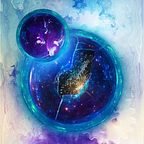What is money?
Money. What a funny concept.
It’s not natural. It doesn’t grow on trees but for some weird reason, we humans sure do love it.
See the money above? What does the monkey view the money as? It sure doesn’t look very important to him, instead, he would prefer a big pile of bananas or something of substance.
Fast-forward to 2021: fiat dollars (AKA paper money, credit card debt, and the balance number on our banking app) act as our trusted third-party in the evolution of our natural two-way barter system.
This desire to instantly obtain any good or service spans back to our early ancestors, but we often forget that they didn’t have the same kind of money as we do now (think Monkey).
For thousands of years, we humans survived just fine using the barter system.
Although some of us like to “make it rain”, it really just comes down to trade.
Money is simply the third-party witness that brokers a trade transaction.
Someone else has something, and we want it.
Depending on where you live or want to travel, one of the following types of money might come to mind.
So it begs the question, what gave fiat dollars any worth in the first place?
Let’s compare scenarios using a bag of gold nuggets or a pile of metal coins (historically considered as “money”).
Currently used bills are easily identifiable by region or face value. Seems easier to count paper bills or just tap your device at the Point of Sale machine than to walk around with heavy silver coins in your pocket.
Paper — and digital money— is thin, light and easy to transport when compared to clunky metals. Definitely easier to carry around and makes larger transactions possible for expensive assets. Imagine buying a house today with a bag of gold/silver coins!
Government backed, supported fiat dollars compared to using the barter system.
In theory, our central authority helps with issuing the amount of money available to further our nation’s economy as a whole relative to our competitors.
As our elected (or given) leaders, they also have a duty to protect our money from external threats. They act in our best interest. Whether you like it or not, the global financial system says we have competitors for determining the value of our money.
Strangers around the world can bet their money on the outcome of our money, all while taking personal action to increase the likelihood of being right on their bet. It used to take a lot of time to bet on other types of money, now it’s pretty much instant.
This information has led me to believe that increasing the amount of our nation’s money is a double-edged sword ⚔️
The Good Side 😺
If we increase the amount of money in our system in balance with needs, we have more to spend!
Meaning, more money to acquire stuff, and more money to create stuff to trade with others. Sounds like a win-win scenario!
If our leaders spend the money wisely, by growing the country in a sustainable manner through rewarding us with money, we benefit because our actions speak through our results, and that strengthens the demand for our countries money.
High demand means our money is worth more, relative to our competition.
The Bad Side 😿
If we consistently increase the amount of money in our system and our economy stalls — if our solution is to keep printing more money, we have more to spend!
As time goes on, you slowly notice that it takes more and more money to acquire the same amount of stuff.
You are confused.
The money has stayed constant at $20, but you slowly notice that you can’t get as much stuff!
To remove complexity, it comes down to critical thinking and historic lessons.
In the end, although people may disagree, the worth (value) of money is determined by two things:
- The supply and demand. How much is circulating? Who wants it?
2. The people’s (both citizen and foreign competition) faith in it’s worth
